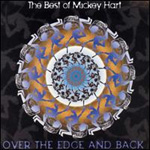Winter Harp plucks up the spirit of the season!
Thursday, December 12, 2002
MacEwan Ballroom (U of C)
Combining medieval Christmas carols with their own vibrant musical compositions, Winter Harp is a Vancouver-based troupe of troubadours that performs and records music using painstakingly reconstructed traditional medieval instruments.
The heavenly reverberations of the classical Spanish and Celtic harps, plucked by multiple-award winners Lori Pappajohn and Jill Whitman, have a commanding presence. Lauri Lyster is Winter Harp’s heartbeat, providing what Pappajohn refers to as "the oldest source of music" – percussion – while Joaquin Ayala and Kenichi Ueda augment the company’s 190 strings with flute, bells and chimes. Poet and performer Alan Woodland animates each show with tales of winter that, according to Pappajohn, are carefully selected for their ability to tug at your heartstrings. They signal that the Yuletide has truly begun.
"Winter Harp gets together in the fall to plan out our next show," says Pappajohn. "We have a hard time deciding what not to include. Alan Woodland travels to England every summer and visits libraries to do research for us on Christmas and winter. He comes up with so many wonderful pieces of literature. No matter how often I hear some of them, they can still bring tears to my eyes."
Resurrecting music that in some cases has gone unheard for centuries is no easy task, but Pappajohn and her associates have discovered that having authentically crafted instruments to perform with makes that music sound even better. Her first inspiration for the customized construction of a specialty medieval replica was the bass psaltery, a haunting instrument with ancient roots.
"The bass psaltery goes back thousands of years," says Pappajohn. "The Sumerians and Babylonians used them. I have one bass psaltery that is about a foot-and-a-half tall. And I thought, ‘Wouldn’t this sound fantastic if it was five feet tall?’ So I went to the best instrument crafter in Canada, a man named Edward Turner, and he laughed at me like I was crazy. But I said, here’s the deal – I’ll pay you. So he made it for me. It’s a five-foot obelisk and the sound it produces is amazingly ethereal. I can only describe it as the sound of sunlight shimmering on the surface of water."
Her next flash of creative genius came when Turner showed her a picture of one of his other original creations, the organistrum. Far from the grating trumpet of its sister crank-handle machine the hurdy-gurdy, the organistrum’s four bowed-up strings have a more harmonious disposition. Its deep tonal voice originated in 12th century Spain and then migrated across Western Europe. Turner copied Gothic cathedral sculptures to perfect his design – there are only two such instruments in existence in the world (the other hangs in the Canadian Museum of Civilization in Ottawa).
"I was ordering my bass psaltery and Ted said, ‘By the way, I made one of these, too.’ The picture was so breathtaking that without even hearing it I said, ‘I’ll take one.’"
For Pappajohn, the realization was beginning to set in that there were dozens of "lost instruments" out there waiting to be rediscovered. Looking at the Christmas carols we all know by rote, she points out that we are reciting lyrics that were written two, three or four hundred years ago. Taking people back to that long-forgotten time has become the theme of Winter Harp’s mystical performances and recordings. Clad in Pre-Raphaelite gowns and surrounded by candles, the members of the ensemble embody the spirit of the season, and convey its message of good will through cheerfully interactive songs and stories.
"We focus on the myth and legend surrounding the darkest time of the year, when people traditionally gather," says Pappajohn. "The Celtic bonfire festivals were an opportunity for everyone to share warmth, companionship, their hopes for the return of the sun, and the coming new year. For centuries it’s been a time when people pause and examine their lives…. There is a time of darkness within all of us that anticipates the returning, the rebirth. For us, it’s a journey. Whether you believe the Christmas story or treat it as a fable, it’s a fun and magical time of year for all."
Winter Harp has recently received a grant from Bravo, which has allowed the troupe to produce its first music video, entitled "Avalon." Filmed on location in England in the pouring rain, "Avalon" will be in rotation on Bravo and is also available (along with more information about Winter Harp) on the group’s Web site, www.winterharp.com.
By Christine Leonard


